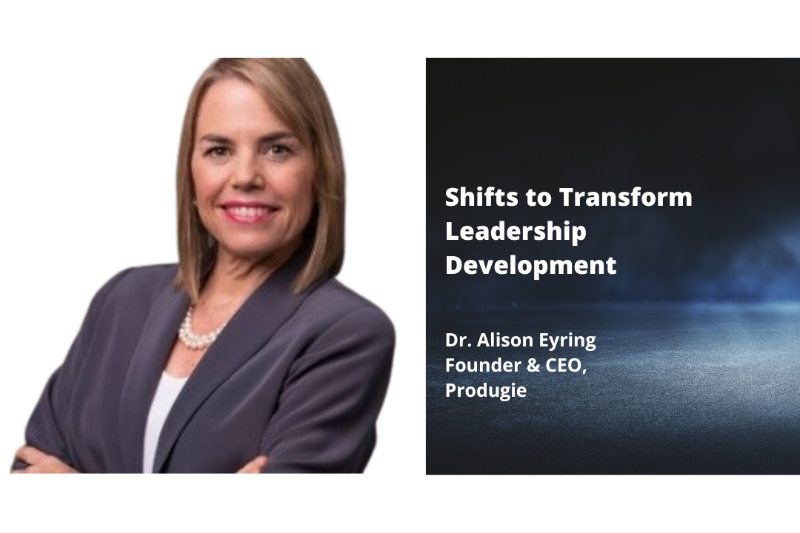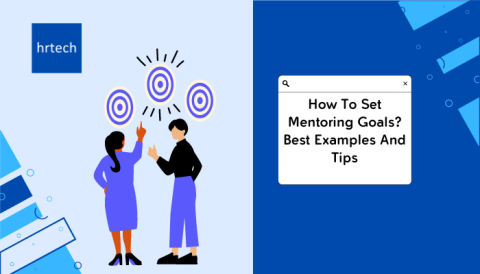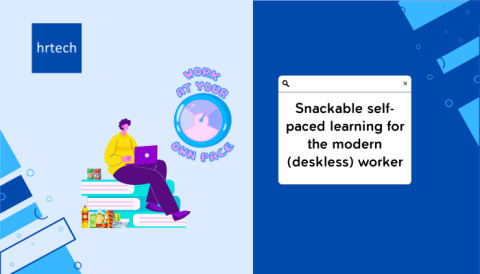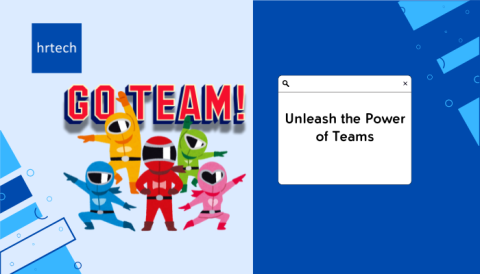Embracing a mindset of systemic leadership effectiveness will require HR, Talent, and Leader & Organization Development professionals to upskill themselves to add greater value to their business.
By Dr. Alison Eyring, Founder & CEO, Produgie

We all feel it: management and leaders face one of the most volatile business environments that we have seen in our careers. This is creating an enormous adaptive organization gap, with woeful stats to highlight it.
Consider that 40% of new managers are underperforming or outright failing in their first two years of their job role; Gallup data shows 50% of employees leave because of their boss; and at least 70% of key change initiatives fail.
No wonder frankly when the majority of managers get no training or less than four hours of training per year. Or when the majority of what is learned in training or development courses is forgotten. It is episodic and not a continual evolution of management skills; and it is certainly not leading to an adaptive, agile organization.
This is thus one of THE biggest gaps in business execution. Leadership is not continually and consistently evolving across the organization. We need an alternative approach that drives consistent and systemic leadership effectiveness.
This is not about technology-enabled microlearning or a better LMS, it’s a shift in mindset and practice that also requires a retooling of HR, talent, and leadership development professionals. So If you want to build an adaptive organization that can thrive in crazy times like these, start by making these nine shifts for systemic leadership effectiveness.
Leadership is the Capacity for Collective Success
It’s impossible to talk about “leadership effectiveness” without a shared understanding of “leadership”. As a scientist myself, I rely on a science-based view of leadership as “the capability to drive collective effort to succeed”. For the CEO, leadership is about ensuring the capability of their company to thrive over time against competitors for product, employees, and capital. For an individual contributor, leadership is about having an impact on others and influencing the delivery of results with and through others. Leadership capability is needed at every level of the business and it involves both individuals and also teams or groups of people acting together. A leader demonstrates leadership. A manager serves in a formal role assigned by the business. These are not opposing ideas and all managers must practice leadership. Many leaders also serve as managers, while others are not.
Leadership Effectiveness Drives the Business to Thrive
Leadership effectiveness is about ensuring that the organization secures and enables the leadership it requires to thrive in good times and bad. Thriving means that it can meet the increasingly high expectations of stakeholders such as customers, employees, and investors. While the CEO and their team are the true owners of leadership effectiveness for their business, HR, and Boards play a critical custodial role. When HR and Boards focus on ensuring that the business is systemically increasing leadership effectiveness, they also ensure the short and long-term survival of the business. For small businesses, there may be no HR professionals or Board, and ownership for leadership effectiveness rests solely on the business owner’s shoulders.
HRTech is democratizing People Management
Over the past decade, technology has made it easier and faster to hire, onboard, monitor and manage managers and employees. HRTech is quickly changing the way managers give feedback, manage performance and measure engagement. Products like CultureAmp, Engagedly, and HiBob are enabling even the smallest of businesses to provision HR services as digital experiences to managers and employees. The tech-enablement of HR has reduced HR admin work and driven manager and employer self-service. But it has not transformed the role of HR nor its ability to enable business performance and growth.
EdTech is democratizing learning and education
While HRTech is enabling the HR function to lower costs and scale performance enablement solutions to all its managers, EdTech is leveraging technology to deliver digestible learning in the flow of work. This technology makes it easier and faster to scale access to content and prompt employees to apply knowledge on the job. Products like LinkedIn, Maivenpoint, and Udemy are democratizing access to content and education. While education and learning are critical to individual effectiveness, these technologies are not focused on building the capabilities science has shown are most critical to business performance and growth such as driving innovation, shaping an externally-oriented culture, aligning diverse stakeholders, and enabling high performance over time without burning people out. So while Edtech is driving efficiency and scale, it is not always driving effectiveness or outcomes important to the business.
The democratization of leadership development is underway
More recently, a growing number of businesses are using technology to lower costs and give greater access to leadership development interventions. The democratization of leadership development is evolving quickly! Companies like BetterUp, Ezra, and CoachHub are making it possible for companies to scale coaching to more managers. Platforms like Humu and BetterManager are democratizing manager development and personalized support. Leadership innovators such as the Center for Creative Leadership and most University-based centers for executive education are blending on and offline learning to increase reach and adapt to the needs of hybrid workplaces. These technologies deliver episodic solutions or interventions that may or may not be integrated with business priorities or challenges the business currently faces. Their impact is hard to measure beyond reactions or responses to the intervention itself.
Shift to a Leadership Activation mindset is required
The mental model of “knowledge acquisition” prevails in the world of leadership training & development. While content increasingly is delivered in smaller chunks and closer to work being performed, it is still a model of knowledge acquisition and application or practice. Leadership development – whether tech-enabled or not – is a relatively slow, unscalable, and unfortunately siloed approach to the problem of leadership effectiveness. To adopt systemic leadership effectiveness, we have to focus on the outcomes or ends we need to achieve for the business. Then we can identify the relevant challenges to be faced and problems to be solved.
Leadership activation is the deployment of leadership actions and behaviors that drive valued outcomes. Like mindfulness which requires years of disciplined practice, the practice of leadership requires a career of intentional practice using repeated patterns of action and behavior that vary with context. Leadership activation starts with a problem to solve or a challenge to face such as delivering high performance over time, accelerating the development of others, or deploying a strategy fast enough to win in the marketplace. It involves others to provide support such as a mentor, one’s manager, a coach, or an advice giver who are enablers that may or may not be required all the time.
Leadership Capability-as-a-Service
Online learning and assessments, and tech-enabled coaching and leader development programs, allow businesses to increase reach and lower costs while providing personalized experiences to leaders. Today, most of these tech-enabled services require bundling with human services. Service providers lower the cost of human services by paying lower wages. But companies must still ration coaching. When human capital technology functions more like Microsoft or Google, the ability to deliver premium or personalized leadership services digitally truly democratizes leadership development. The ability of humans to use this technology flexibly and without code is critical for success because every business is different, every team is different and every person is different. In the world of technology, we’d call this “leadership capability-as-a-service”.
Leadership Effectiveness for Adaptive Organizations
Technology with predictive leadership capability intelligence and embedded resources can accelerate leadership activation for individuals and teams. It makes it easier for them to solve problems, sustain their effort and improve, and it systematically builds leadership effectiveness. Increased leadership effectiveness increases the growth capacity of a business. I call this category of technology, which spans HRTech, WorkTech, and EdTech “Adaptive Organization Systems.” Produgie is an example of technology that is defining this category today.
Technology for Human Transformation
Embracing a mindset of systemic leadership effectiveness will require HR, Talent, and Leader & Organization Development professionals to upskill themselves to add greater value to their business. Will this make their lives easier? No. This technology will make it more meaningful and impactful. It raises the opportunity for impact and it also places greater demands to leverage the technology for transformation and business adaptation. There is an upside and a downside to this for everyone.
Produgie technology delivers affordable and massively scalable premium leadership services. These services are traditionally administered by HR and delivered by internal or external leadership coaches and consultants. Automations and self-service in Produgie remove administrative burdens. Still, more importantly, the services enable HR, Strategy, Operations, Sales & R&D leaders to activate leadership to drive innovation, strategy deployment, change, people development, and a growth culture across hybrid and rapidly evolving workplaces.
Join us!
If you are excited to learn how you can use technology to enable systemic leadership effectiveness in your business, connect with us a Produgie. Our platform equips leaders and teams to acquire and business mindsets, capabilities, and culture required for business performance and growth. Try it for free: www.produgie.com or ask us for a demo.
About the Author:

Founder & CEO, Produgie. Chair of the Board, Organisation Solutions. Adjunct Professor at the National University of Singapore. Author of the award-winning book, “Pacing for Growth: Why Intelligent Restraint Drives Long-Term Success.





